
Tatarstan, officially the Republic of Tatarstan, sometimes also called Tataria, is a republic of Russia located in Eastern Europe. It is a part of the Volga Federal District; and its capital and largest city is Kazan, an important cultural centre in Russia. The region's main source of wealth is oil with a strong petrochemical industry.

Kazan is the largest city and capital of Tatarstan, Russia. The city lies at the confluence of the Volga and the Kazanka Rivers, covering an area of 425.3 square kilometres, with a population of over 1.3 million residents, and up to nearly 2 million residents in the greater metropolitan area. Kazan is the fifth-largest city in Russia, being the most populous city on the Volga, as well as within the Volga Federal District.
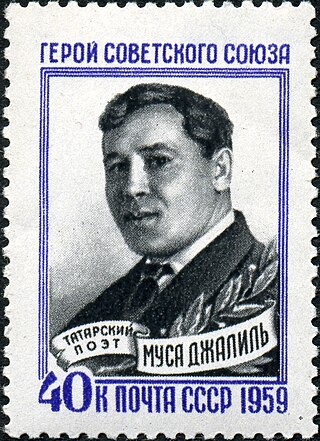
Musa Cälil was a Soviet–Tatar poet and resistance fighter. He is the only poet of the Soviet Union awarded simultaneously the Hero of the Soviet Union award for his resistance fighting and the Lenin Prize for having written The Moabit Notebooks; both awards were bestowed upon him posthumously.

The state flag of Tatarstan, a republic of Russia, was introduced in 1991.
Three scripts are currently used for the Tatar language: Arabic, Cyrillic and Latin.
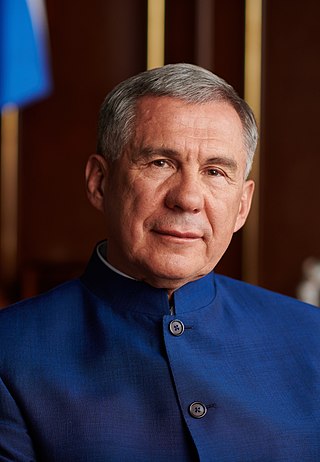
Rustam Nurgaliyevich Minnikhanov is a Russian politician who has served as the head of Tatarstan, a federal subject of Russia, since 2010.

The Idel-Ural State, also known as the Volga-Ural State or Idel-Ural Republic, was an unsuccessful attempt of the autonomy of Tatar peoples that claimed to unite Tatars, Bashkirs, and the Chuvash in the turmoil of the Russian Civil War. The republic was proclaimed on 1 March 1918, by a Congress of Muslims from Russia's interior and Siberia, but defeated by Bolsheviks the same month. Idel-Ural means "Volga-Ural" in the Tatar language.

The territory of Tatarstan, a republic of the Russian Federation, was inhabited by different groups during the prehistoric period. The state of Volga Bulgaria grew during the Middle Ages and for a time was subject to the Khazars. The Volga Bulgars became Muslim and incorporated various Turkic peoples to form the modern Volga Tatar ethnic group.
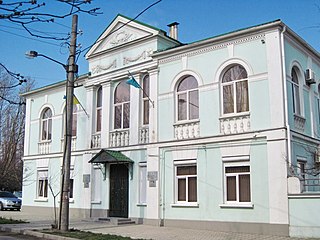
The Mejlis of the Crimean Tatar People is the single highest executive-representative body of the Crimean Tatars in period between sessions of the Qurultay of the Crimean Tatar People. The Mejlis is a member institution of the Platform of European Memory and Conscience.

Islam in Tatarstan existed prior to the tenth century, but it began major growth in 922, when Bulgar ruler Almış converted to Islam. This was followed by an increase in missionary activity in Volga Bulgaria. Islam remained the dominant religion through the Mongol invasion and subsequent Khanate of Kazan. In 1552, the region was finally conquered by Russia, bringing the Volga Tatars and Bashkirs on the Middle Volga into the tsardom. Under Russian rule, Islam was suppressed for many years, first during the Tsardom and Empire and later during the Soviet era. Today, Islam is a major faith in Tatarstan, adhered to by 47.8–55 percent of the estimated 3.8 million population, making it one of the two dominant religions in the region, the other being Orthodox Christianity.

Aydar Gabdulkhaevich Akhatov is a Russian state, political and public figure, journalist, scientist-economist, ecologist, lawyer, artist. He is an ethnic Tatar.
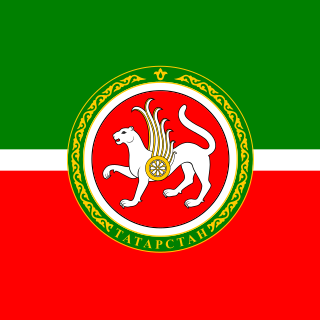
The Head of the Republic of Tatarstan, formerly known as the President of the Republic of Tatarstan, is the head of the republic and the highest-ranking official of Tatarstan, a federal subject of Russia. The office was established in 1991.

A sovereignty referendum was held in Tatarstan, Russia, on 21 March 1992. Voters were asked whether they approved of Tatarstan being a sovereign state.

Ildar Irekovich Gilmutdinov is a deputy for the United Russia party in the 7th State Duma of the Russian Federation. He is the head of the committee for nationalities. Chairman of the Council of the Federal National and Cultural Autonomy of the Tatars. Gilmutdinov received international sanctions in 2022 for his support of the Russian invasion of Ukraine.

Chuvash nationalism or the Chuvash national movement is the belief that the Chuvash people are a nation. The movement, which originated in the 16th century, has included the evasion of taxes and duties, local armed actions, petitions to the authorities, withdrawal to regions weakly controlled by the state, participation in large-scale anti-government protests, and persistent resistance to mass Christianization.

Fauziya Aukhadiyevna Bayramova is a Tatar politician and writer. She was a founder of the Tatarstan independence party The Ittifaq Party. From 1990 to 1995 she was a member of the State Council of the Republic of Tatarstan. From 1994 to 1997 she was the chair of the Milli Majlis, the unrecognized Tatar parliament, which she helped to establish. She was also a contributor to the constitution of Tatarstan. She has written a number of political manifestos and histories, focusing on topics relating to the Tatar people and their political circumstances, and has worked as a journalist and publisher.
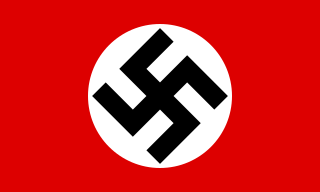
The National Socialist Russian Workers' Party was an ultranationalist social and political organization operating in the city of Kazan in 1994–1997.
Xädiçä Yamaşeva, Tatar pronunciation:[χædiˈɕæjɑˈmaʃɯwa]) was a dentist and a member of a revolutionary movement.
Fatix Säyfi-Qazanlı was a Russian public figure and writer. Executed during the Great Purge, he was subsequently rehabilitated.

Tatar nationalism is the belief that Tatars should constitute an independent nation. Finding historical basis in the Khanate of Kazan and Russian–Tatar enmities, Tatar nationalism has often synthesised Islam as a national aspect. Tatar nationalism has historically manifested itself as the Idel-Ural State, as well as the Declaration of State Sovereignty of Tatarstan and the country's period of de facto independence from Russia in the early 1990s.
















